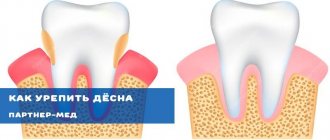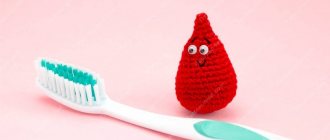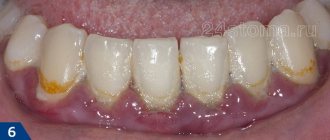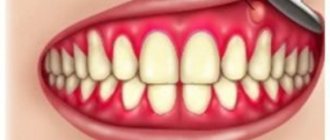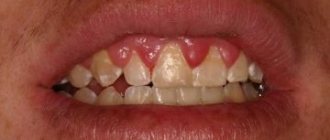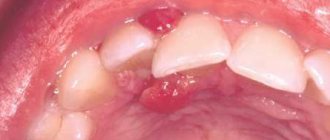Bad breath and bleeding gums are considered common symptoms among potential dental patients. The unpleasant sensations accompanying the patient disturb not only him, but also those around him, because the smell from the mouth when the soft periodontal tissues are bleeding cannot be removed for a long time.
The cause of regular bleeding in the mouth and severe odor can be several diseases, and not all of them are directly related to dentistry. In this material we will consider in detail the symptoms of diseases and methods of treating these ailments.
note
- Privacy Policy
Causes of bleeding gums
If your gums are bleeding, the reasons may be:
- Poor oral hygiene, which may include using a hard-bristled toothbrush and brushing too vigorously. The gums are injured and blood appears.
- Negligent oral care. Many people spend no more than a minute brushing their teeth, which does not allow them to completely remove food debris that contributes to the formation of tartar. It can be located both above and below the gum. If tartar is under the gum, it begins to move it away from the tooth, causing bleeding.
- Oral diseases. Diseases such as gingivitis, periodontitis, periodontitis and periodontal disease are often accompanied by bleeding gums. Much less often, this phenomenon is caused by completely different diseases: ARVI, diabetes mellitus, blood cancer, hemophilia.
- Taking certain medications. Certain medications can thin the blood, but they have side effects, one of which is bleeding gums. As soon as the patient stops taking them, the gums also return to normal.
- Poor nutrition. The lack of vitamins B, C, E and K greatly affects the health of the gums.
- Dental procedures. If the gums bleed as a result of the manipulations, the reasons for this may be poorly installed crowns or low-quality dentures, which can injure the gums. Quite rarely, blood may appear after brushing your teeth at the dental clinic.
Predisposing factors
Bleeding gums can be caused by injury or disease. But there are a number of factors that make the risk of this symptom appearing higher.
Gums bleed in patients:
- with chronic inflammatory diseases of the oral cavity;
- with xerostomia - dry mouth;
- with reduced immunity, including HIV and AIDS;
- with vitamin deficiency, especially C and K;
- with mouth breathing;
- with poor or irregular oral hygiene.
These factors cannot be called the cause, but they contribute to the development of bleeding gums. Those for whom none of the points apply have a much greater chance of not learning about such a problem.
If your gums bleed in the morning or at night
Peak bleeding at night or in the morning indicates an unsuitable toothbrush. During brushing, the gums are injured. In this case, you need to visit the dentist and take a hygiene lesson with the selection of personal hygiene products.
Bleeding gums may not be normal. It is definitely worth finding out the cause and treating it before the disease reaches a chronic stage.
Vitamins for bleeding gums
Do you have bleeding gums and bad breath? So know: often these symptoms haunt a person whose food is poor in vitamins. Therefore, you should definitely include in your diet foods rich in nutrients, micro- and macroelements.
Vitamin C helps prevent gum inflammation and bleeding and helps reduce the susceptibility of the oral mucosa to various infections. This vitamin is found in cabbage, citrus fruits, green onions, celery, red peppers, potatoes, kiwi, parsley, currants, spinach, and raspberries.
Vitamin B makes gums and teeth strong and prevents cracks and ulcers from appearing in the mouth. It is found in asparagus, garlic, buckwheat porridge, wholemeal bread, milk, lamb, apples, chicken eggs, oatmeal, almonds, Brussels sprouts, and beef.
Vitamin PP prevents the development of stomatitis and gingivitis. It can be found in foods such as beans, yeast, buckwheat, beef liver, pineapple, and beets.
Vitamin E heals wounds on the mucous membrane well. They are rich in peas, bread, sprouted wheat, lettuce, corn, vegetable and butter, dairy products, legumes, and cod.
Vitamin K prevents bleeding gums. There is a lot of it in avocado, pumpkin, cabbage, carrots, soybeans, tomatoes, bananas, spinach, cucumbers, rose hips, and dairy products.
If your gums are bleeding and bad breath causes discomfort, then the best remedy in this case is carrot juice. You should drink it in the morning before meals, and within a few days your gums will become healthier.
Gums bleed in pregnant women
While carrying a child, a woman’s body undergoes restructuring: special hormones begin to be produced, and the body changes. This also applies to the oral cavity. Every second pregnant woman is diagnosed with hypertrophic gingivitis. It is manifested by an increase in gingival papillae and the appearance of bleeding.
The cause of this condition in a pregnant woman can also be the accumulation of bacteria due to an increase in the depth of the gum pockets. Bacteria accumulate in them, causing inflammation. Proper brushing helps to avoid the development of bleeding gums. It is better to use an irrigator and mouth rinses for this.
What is gingivitis?
The most common gum disease accompanied by redness and bleeding is gingivitis, the symptoms and treatment of which we will discuss below. Its chronic form is extremely difficult to get rid of. At an early stage, this disease does not cause any trouble, but after a while some discomfort appears.
Gingivitis is an inflammation of the gums that is characterized by redness, bleeding and swelling. Its symptoms are: pain when chewing food, itching in the area of inflammation, bad breath. The acute course of the disease is manifested by severe pain and sharp redness of the gums. If this is a chronic form, then the symptoms worsen in the fall and spring, but not too much. There is some discomfort, but quite tolerable. Bleeding may increase slightly.
How is gingivitis treated?
Only a qualified dentist can determine the symptoms and treatment of this disease. The fact is that the signs of the disease are similar to those that accompany periodontitis, periodontal disease and stomatitis, so self-medication is not recommended. It is much better to take the time and pay a visit to the clinic.
Gingivitis can be treated fairly quickly at an early stage. The acute form disappears in 10 days. The chronic stage requires longer treatment. The doctor must prescribe a complex of vitamins to boost immunity. The periodontist can also prescribe vitamin injections (“Cyanocobalamin”, “Lincomycin”) and lidocaine. Vitamins relieve symptoms, and lidocaine reduces pain.
Sometimes this disease is treated with antibiotics, which are most effective in the acute stage. In addition, they prevent the development of complications.
Also used for treatment are ointments and gels that relieve inflammation and alleviate symptoms. By covering the gums with a thin film, they help protect it from temperature and chemical irritants.
Which doctor will help if my gums are bleeding?
If you have bleeding gums, you should consult a dentist. In the absence of complications, the doctor’s specialization does not play a role.
If the condition is complicated by the appearance of a lump with pus, you should immediately go to a dental surgeon. He will determine the type of tumor, choose treatment tactics and, if necessary, perform urgent surgery. At the Matisse Dent clinic, you don’t need to make an appointment several weeks in advance, endure pain and wait for help. With an acute condition, doctors will accept and perform surgery on the day of treatment.
Use of medicinal herbs
A decoction of oak helps in this case. The product has an anti-inflammatory and astringent effect. The result is usually noticed immediately, but the problem can be completely eliminated only after 2 weeks of intensive rinsing.
Chamomile has a wound healing and antimicrobial effect. To prepare the decoction, take 2 tbsp. l. flowers, pour a glass of boiling water and leave for 20 minutes. You should rinse your mouth twice a day.
Another highly effective anti-inflammatory agent is sage. It helps eliminate swelling and relieve gum soreness. To prepare the infusion, 2 tbsp. l. The herbs are brewed with a glass of boiling water, left for a couple of hours, and then rinsed out. The course is until complete recovery.
Nettle is considered a wonderful hemostatic plant, so it is used for intense bleeding. It is brewed in the same way as sage and used for rinsing 2 times a day.
Pharmacy products for the treatment of bleeding gums
If your gums bleed, what should you do? At home, various modern products sold in pharmacies are often used. These can be toothpastes and gels.
Toothpastes specially designed to treat bleeding gums contain anti-inflammatory components that reduce tissue swelling, eliminate soreness and promote healing. We are talking about such pharmaceutical products as Lakalut Active and Lakalut Phytoformula. The first paste is prohibited from being used for a long time - it is used as an “ambulance”, and the second is good for preventive purposes.
If your gums bleed and bad breath persists for a long time, dentists advise paying attention to special gels. They are applied directly to the gums, allowing the gel to easily penetrate the tissue. The effect occurs very quickly - pain goes away, bleeding stops and swelling is eliminated. The most common remedy is Cholisal gel.
Swelling
Swelling may appear after gum injury. In this case, it is localized, extends only to the site of the bruise, may hurt a little, but in general it goes away quickly. If after an injury the swelling persists for a long time, intensifies, the pain becomes acute or throbbing, you need to consult a doctor.
In other cases, swelling of the gums is a symptom of inflammation. It is accompanied by pain, bleeding may appear, the color of the mucous membrane changes (it becomes darker or acquires a bright red tint). Such swelling may accompany gingivitis or periodontitis.
Using antibiotics to treat gums
If no means help eliminate the problem, then antibiotics come to the rescue. For gum inflammation caused by various microorganisms, the following medications are used:
- "Metronidazole".
- "Lincomycin."
- "Clindamycin."
- "Nomitsin".
- "Siflox."
- "Tarivid."
Antibiotics for gum inflammation should be used only as prescribed by a doctor; self-medication is strictly prohibited. Such drugs are indicated only for the treatment of moderate and severe forms of periodontitis. Antibiotics are prescribed immediately or during the removal of tartar.
Preventive measures
If your gums bleed and bad breath prevents you from living normally, this is, of course, a problem. It’s better not to bring yourself to this state, but the following preventive measures will help:
- after eating you need to brush your teeth;
- It is recommended to use dental floss, which carefully removes food debris between the teeth;
- the menu must contain raw vegetables and fruits, especially those rich in vitamin C;
- After brushing your teeth, you must use a mouthwash to prevent the formation of tartar;
- It is best to quit smoking;
- It is necessary to visit a dentist, who can detect the disease at an early stage and begin treatment.
Children's gums bleed
Young children enjoy brushing their teeth the least. If parents do not control the quality of oral hygiene, gingivitis occurs. In this case, the main symptom of the disease is bleeding gums.
The physiological cause of this condition in children is the process of teething. In this case, the integrity of the gum is compromised and it can bleed.
Problems with the gums are also caused by an incorrect bite. In this case, soft tissues are injured by teeth that are incorrectly positioned relative to each other.
Wearing orthodontic appliances can damage the integrity of the gums. This especially happens when wearing braces with uneven edges. To prevent injury, locks must be treated with special wax. But children often forget to do this; as a result, braces damage soft tissues, causing bleeding.
“Disease of dirty hands” - stomatitis, also more often affects children. They take less care of hygiene, which provokes the appearance of characteristic ulcers on the mucous membrane.
Some parents believe that children do not need to treat their baby teeth, because they will still be replaced by molars. This opinion is erroneous, because caries is caused by bacteria, and their constant presence in the mouth leads to periodontitis. The disease is characterized not only by bleeding gums, but also by the appearance of bumps with pus. This condition requires immediate medical intervention, otherwise serious complications arise.
